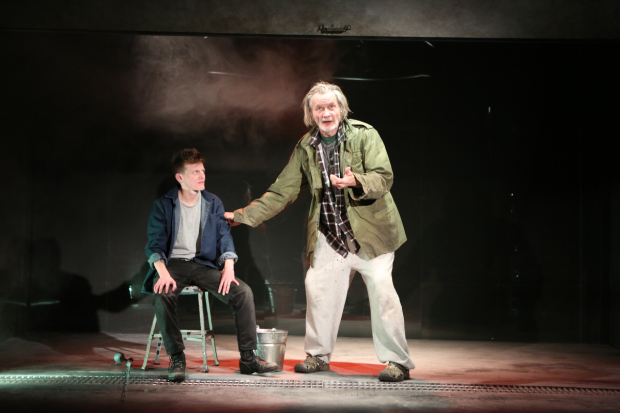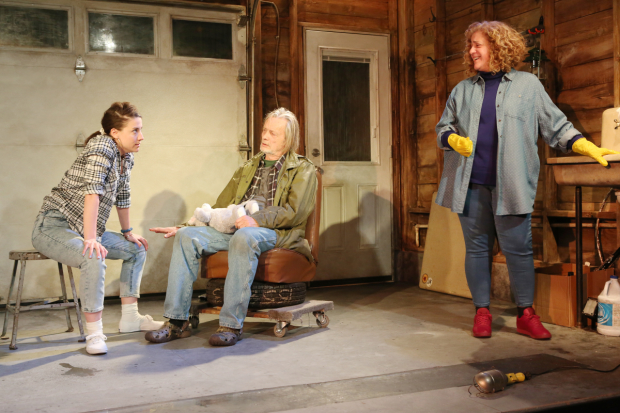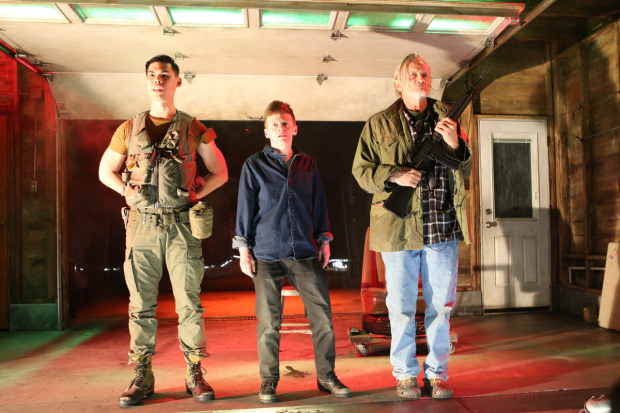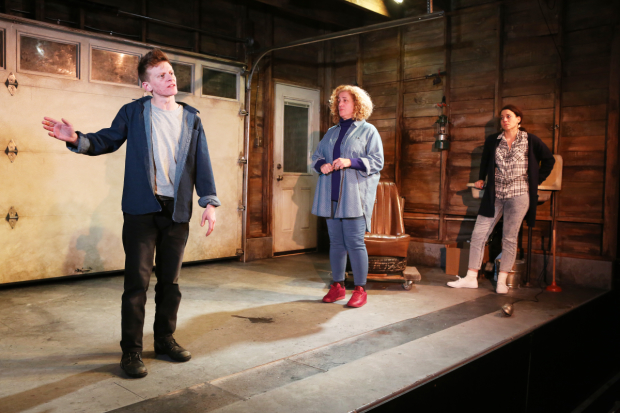Orange Julius

(© Sandra Coudert Graham)
Don't expect fruity refreshment from Basil Kreimendahl's Orange Julius, now making its New York debut at Rattlestick Playwrights Theater (in a coproduction with Page 73). While the title conjures images of happy kiosks in suburban malls, Kreimendahl spikes this memoir of Middle America with the bitter taste of poison.
Julius (Stephen Payne) is a Vietnam veteran living in Massachusetts with his wife, France (Mary Testa delivering her special blend of tenderness protected by a hard outer shell). They have two daughters: Crimp (Irene Sofia Lucio, perfecting the role of the mean big sister) and Nut (Jess Barbagallo). Or, at least, they think they have two daughters. Nut is our trans-masculine narrator (mom and dad use the word "daughter" even though Nut's relationship to them is more that of a son). But Nut's transition from daughter to son isn't the focus of this play. Instead, Nut shares memories of growing up with Julius in the 1980s and '90s. The war was long over, but it still quietly rages in their family home.

(© Sandra Coudert Graham)
Julius was exposed to Agent Orange, a toxic chemical the U.S. military used to destroy crops and forests in order to deny Communist guerillas food and a place to hide. As a result, he can no longer grow any hair on his legs…and this is the least of the carcinogen's harmful effects.
In his riveting and real performance, Payne portrays Julius as aloof, but dutiful. With a gruff voice and a protective manner, he does all of the things a dad is supposed to do, but it never seems to give him much joy. Even when he's the center of attention, he's never quite there. One gets the sense that Vietnam is regularly on his mind, even if he never talks about it.
To deal with dad's radio silence, Nut concocts elaborate fantasies about a young, virile Julius stomping through jungles with his army buddy, Ol' Boy (Ruy Iskandar, who holds his machismo firmly in his pelvis). Nut is there too, magically teleported back in time to cursing up a storm and talking about chicks. These scenes portray a hypermasculinity that Nut clearly covets. It becomes an increasingly desperate defense mechanism as the play progresses: "This is like them body builders. You know they get all greased up to look bigger and tougher," 'Ol Boy says while covered in a thick film of Agent Orange. "That’s us right now. Bigger and tougher. Grease me up motherf***ers!" It would be hilarious if we didn't know any better.

(© Sandra Coudert Graham)
Barbagallo is an affable and engaging narrator, which is a good thing because much of the story is delivered through direct address to the audience. Unfortunately, some passages get the balance between show and tell (essential to a good memory play) wrong. It often feels more like the reading of a particularly well-written memoir than a drama, as Nut vividly describes things that we would still rather see portrayed onstage. During these moments, not even the magnetic Barbagallo can fully hold our attention.
Luckily, this flaw in the script is mostly assuaged by Dustin Wills' illuminating and efficient staging, which has the five performers act out most of Nut's narration. When Nut talks about a drag king at a gay bar, the ultrabutch Iskandar, still wearing army fatigues, suddenly transforms into the role of a preening burlesque performer. The five actors effortlessly slip in and out of such moments, helping to make Kreimendahl's disjointed narrative crystal clear.
Kate Noll's atmospheric set facilitates fluidity. It depicts that great suburban chapel of transition: the garage. It is open enough to allow the creation of winding roads and rice paddies, but intimate enough to be the interior of a car or a bedroom. A boxy old television on a workbench flickers vintage TV from the 1980s (painstakingly well-curated by Joey Moro), giving us little hints about the time and generally adding to the air of late 20th-century domesticity. Palmer Hefferan's jarring and layered sound design blends garage noises with the battlefields of Vietnam: Sometimes we cannot tell if the bass causing the floor to vibrate beneath us is part of a song or a helicopter about to land.

(© Sandra Coudert Graham)
This might be how Julius feels all the time: Words, sounds, and images trigger a sense memory for him, instantly catapulting him back to the war. He left Vietnam, but it never really left him. Despite the playwright's inability to fully embrace the form of playwriting, Kreimendahl delivers a sensitive and moving portrait of Julius and his family — one painfully familiar to millions of American military families.










